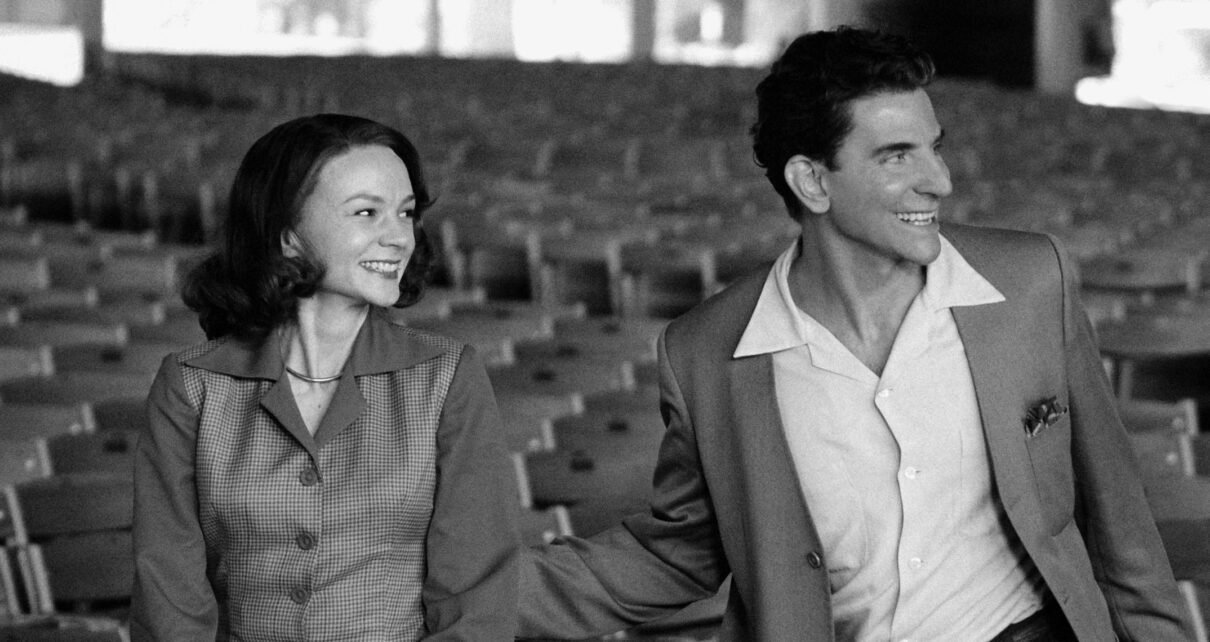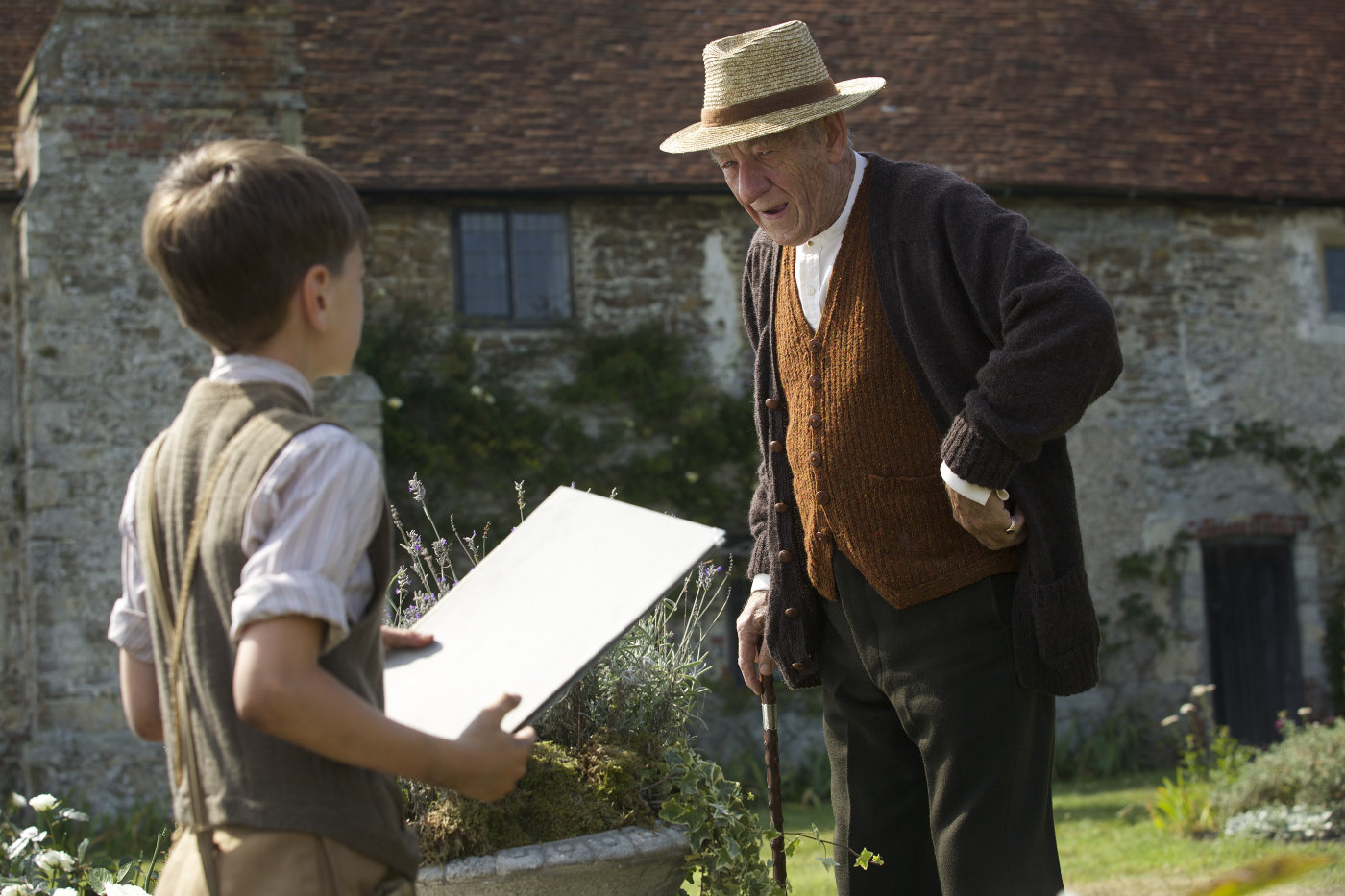Leonard Bernstein was bi-sexual. Well, whoop-de-doo. Look, I’m sure this might have been big news last century, but even in context of this revelation, he still wasn’t the biggest “Lenny” of the 1960s. And there seems little reason he should have been. The ultra-talented composer had a life of smiles and meet-n-greets, but little more it seems.
Here’s the thing – I like my biopics to be a little more than “we like this guy.”
History says Leonard Bernstein (writer/director/cosplayer Bradley Cooper) filled in for an ailing Bruno Walter in conducting the New York Philharmonic at Carnegie Hall on November 14, 1943. This was, arguably, the biggest day in Bernstein’s life, so, naturally, we almost learned something about it. Turns out the occasion made Leonard happy. There’s some keen insight.
Of course, it seems most things made Leonard happy. Cooper plays Bernstein as perpetually upbeat. I didn’t see a genuine change in demeanor until he squabbles with his wife over an hour in. The substitution above was the biggest New York had seen since Lou Gehrig stepped in for an ailing Wally Pipp on June 2, 1925. Lou didn’t give up that job until 1939. Similarly, Leonard Bernstein was immediately recognized as a superstar talent and “the first great American composer.”
What was it about Bernstein that made him better than other composers? Heck if I know; maybe that’s in another film. I know this much: never before have I so desired for the Marx Brothers to show up.
Clearly bi-sexual as established from the outset, Bernstein chose to marry an actress, Felicia Montealegre (Carey Mulligan), all the same. Felicia knew about Leonard’s bi-sexuality and promiscuity from the outset, but they still get to fight about it a bunch in the second half of the film, cuz, otherwise, the film doesn’t seem to have anything else to do. Check out how the biggest directorial moment of the film occurs while the two are squabbling during the Thanksgiving Macy’s Day Parade while Snoopy floats by.
FWIW, both the cinematographer (Matthew Libatique) and editor had a lot of fun with this film. Half the film is shot in b&w for absolutely no reason other than “the decade changed.” And the editor loved splicing surprise exits and entrances together. It would have been better if either professional was good at storytelling, but that’s for another film.
“If it is so good, why didn’t it come out in theaters?” is a relevant question now that we are significantly past pandemic times. And the answer to this Netflix coup is: quite frankly, it isn’t. Maestro is a film you’ll snore during long before you’ll applaud it. And, yet, a Best Picture nomination happened. If I had to guess, it is because Martin Scorsese and Steven Spielberg both appear among the production credits. Well, gosh, those guys can’t possibly be producing a shitty film, can they?
pandemic times. And the answer to this Netflix coup is: quite frankly, it isn’t. Maestro is a film you’ll snore during long before you’ll applaud it. And, yet, a Best Picture nomination happened. If I had to guess, it is because Martin Scorsese and Steven Spielberg both appear among the production credits. Well, gosh, those guys can’t possibly be producing a shitty film, can they?
Yes, they can. And while we’re on the subject of undue nominations, Carey Mulligan for Maestro over Margot Robbie for Barbie is a travesty. Don’t even try to defend that one; there is nothing there to defend.
I’m trying to find the smiles here, and they’re just not coming. Yeah, the editing and cinematography piqued my imagination, but much more for “why?” than “how?” I suppose I was amused at the back-to-back scenes in which Bernstein snorts coke while wearing what appears to be an Evel Knieval jumpsuit and then the film finds Felicia who is, for some reason, dressed as Judge Judy. Again, “why?” Only at the very end of the film do we get even then slightest of glimmers into what made Bernstein the talent that he was. Why was it saved for a throwaway moment in Community College at the end of a 129-minute film? No freaking idea.
Maestro was professionally shot and acted, but -let’s face it- you aren’t going to find a more “Who cares?” bio pic this year. He’s an American success story. He had a family. He probably cheated on his spouse. Congratulations, you’ve just described thousands upon thousands of people. Maestro needed to tell me why I should care about Leonard Bernstein. I am still waiting for the answer to that question.
There once was a composer named Lenny
As talented as Louis, Babe, or Benny
I don’t wish to be rude
Yet can only conclude
I’m so happy his story didn’t cost a penny
Rated R, 129 Minutes
Director: Bradley Cooper
Writer: Bradley Cooper, Josh Singer
Genre: Cures for insomnia
Type of being most likely to enjoy this film: I dunno. Jewish and Bi- Americans in the 1980s, perhaps?
Type of being least likely to enjoy this film: People that like movies where something happens



